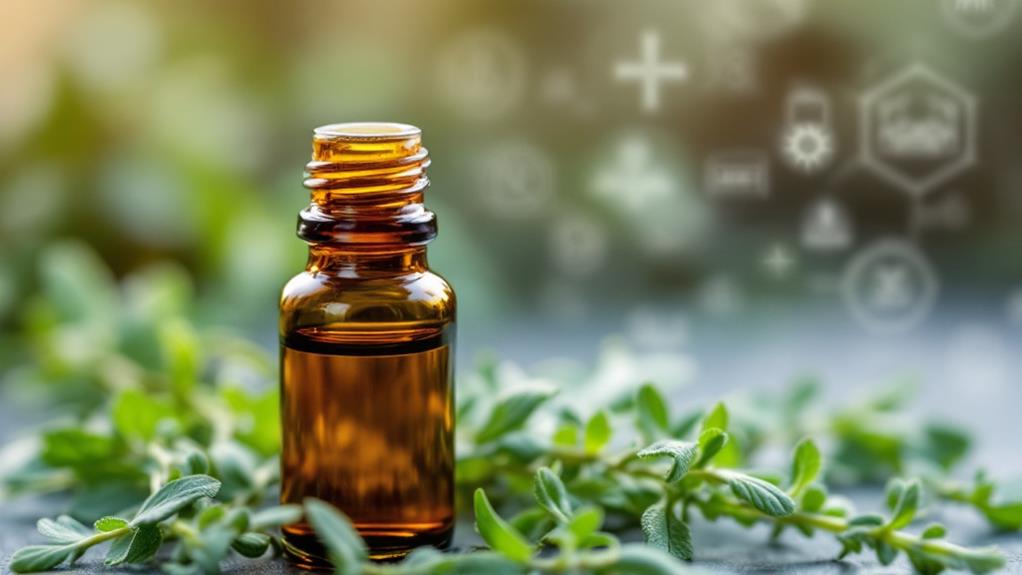How to Make the Most of Oregano Oil’s Health Benefits: A Complete Guide

To make the most of oregano oil's health benefits, start by understanding it's rich in compounds like carvacrol and thymol, which fight infections and resist antibiotic-resistant bacteria. Use it for digestive issues or to enhance your immune system. Apply diluted oil topically to minimize side effects and follow manufacturer dosages if ingesting oil of oregano. It's key to consult with healthcare providers, especially if you're pregnant or on medication. Avoid overuse to prevent discomfort like nausea or headaches. If you want to investigate the full potential and new research on oregano oil, more insights are available.
Understanding Oregano Oil
Derived from the Origanum vulgare plant, oregano oil is packed with powerful compounds like carvacrol and thymol, known for their strong antioxidant and antifungal properties. As you investigate oregano oil, you'll uncover its impressive health benefits, particularly its antibacterial properties. This vital oil form has been recognized for its ability to combat antibiotic-resistant bacteria, such as Staphylococcus aureus. This makes it a valuable ally in supporting your immune system against diverse infections.
However, oregano oil is highly potent. If you're planning a topical application, remember to dilute it with a carrier oil to prevent skin irritation. Direct application of the vital oil form can be too harsh. For those considering internal use, note that oregano oil should not be consumed directly. You can find it in capsule form, which might be preferable if you want to avoid its strong taste.
Oregano oil also promotes digestive health. Its antifungal properties can help balance your gut flora, potentially improving digestion. As you incorporate oregano oil into your routine, you'll be tapping into the natural power of the Origanum vulgare plant for better health.
Exploring Health Benefits
As you investigate the remarkable health benefits of oregano oil, you'll find it's more than just an aromatic improvement to your spice rack. Packed with potent compounds like carvacrol and thymol, oregano oil offers impressive antibacterial and antifungal properties. It effectively combats infections caused by bacteria such as Staphylococcus aureus and Candida species. Furthermore, its high antioxidant content surpasses many fruits and vegetables, helping to tackle oxidative stress and bolster your immune system.
Oregano oil's health benefits extend to digestive health. It may help address small intestinal bacterial overgrowth (SIBO) by eliminating harmful gut bacteria, potentially easing symptoms of gastrointestinal disorders. In addition, its anti-inflammatory effects are significant. They can aid in managing conditions like arthritis and contribute positively to skin health, improving acne and other inflammatory skin conditions.
Preliminary studies hint at oregano oil's potential anti-cancer effects, especially against colon and breast cancer cells. While more human research is necessary, these findings are promising. Here's a quick overview of oregano oil's health benefits:
- Antibacterial and antifungal properties
- Support for digestive health and SIBO
- Potential anti-cancer effects
These benefits make oregano oil a powerful supplement to your health regimen.
Safe Usage Guidelines

To safely enjoy the benefits of oregano oil, it's vital to follow proper usage guidelines. This potent oil offers significant health benefits, but moderation is key to avoiding side effects. Manufacturer guidelines are your best friend here, especially for recommended dosages. If you're applying oregano oil topically, remember to dilute it with a carrier oil. Mix 1-2 drops of oregano oil with a teaspoon of carrier oil to prevent skin irritation and allergic reactions.
When it comes to oral consumption, it's important to differentiate between oregano essential oil and oil of oregano. The essential oil isn't safe to ingest and should only be used topically after dilution. However, oil of oregano, derived from the plant, is safe for ingestion if you stick to recommended dosages. If you're pregnant or have underlying health conditions, consult with a healthcare provider before using oregano oil. Its safety during pregnancy hasn't been well-established, so caution is advised.
Potential Side Effects
Oregano oil's potency means it can cause side effects if not used carefully. While it offers numerous benefits, understanding its potential drawbacks is important to using it safely.
- Gastrointestinal Discomfort: Excessive use of oregano oil can lead to gastrointestinal discomfort, including nausea, vomiting, and abdominal pain. It's important to adhere to recommended dosages to avoid these issues.
- Allergic Reactions: Some individuals might experience allergic reactions. Conducting a patch testing before applying oregano oil topically can help you identify any sensitivities and prevent adverse effects.
- Interactions with Medications: Oregano oil can interact with certain medications, particularly blood thinners and diabetes medications. If you're on these medications, consult a healthcare provider before using oregano oil to avoid unintended consequences.
Pregnant individuals should exercise caution, as the effects during pregnancy aren't well-studied, and potential risks remain. It's always wise to seek advice from a healthcare provider if you're pregnant or nursing. Overconsumption may also lead to dizziness and headaches, so sticking to recommended dosages is important. By being aware of these side effects, you can make informed decisions about incorporating oregano oil into your wellness routine.
Latest Research Insights

Recent research on oregano oil reveals its promising therapeutic potential, particularly due to its high carvacrol content. This compound is known for its significant antibacterial activity, effectively combating 11 antibiotic-resistant bacteria. Such findings highlight oregano oil's potential in addressing foodborne pathogens, making it a valuable supplement to your health regimen.
Moreover, oregano oil's health benefits extend to gastrointestinal wellness. Studies indicate that carvacrol and thymol may help treat small intestine bacterial overgrowth (SIBO), offering a natural option for managing this condition. If you're dealing with SIBO, incorporating oregano oil might support your gut health.
Oregano oil also exhibits strong antifungal properties, particularly against Candida albicans. Research supports its effectiveness in treating nail fungus when applied topically, providing a natural alternative to conventional treatments.
Intriguingly, preliminary studies suggest oregano oil might inhibit certain cancer cells, especially in lung and breast tissues. While these findings are promising, further human studies are necessary to confirm these effects and understand its role in cancer treatment.
Ongoing investigations examine how oregano oil compounds might work synergistically with other natural substances, potentially enhancing its therapeutic potential in multiple health applications.




